 SCDEA signs ‘info sharing’ agreement with Law Society over crooked lawyers involved only in crime gangs. AFTER MANY YEARS of chasing ‘crooked lawyers’ linked to Scotland’s criminal underworld apparently without gaining one single conviction, the Scottish Crime & Drug Enforcement Agency (SCDEA) has signed an ‘information sharing’ agreement with the Law Society of Scotland which allegedly grants the Police access to information on lawyers otherwise not shared by the Law Society such as breaches of professional rules, standards or criminal activity. The deal is two-way, with the Law Society expecting Police to inform the notoriously corrupt regulator of information relating to information they gather on rogue lawyers.
SCDEA signs ‘info sharing’ agreement with Law Society over crooked lawyers involved only in crime gangs. AFTER MANY YEARS of chasing ‘crooked lawyers’ linked to Scotland’s criminal underworld apparently without gaining one single conviction, the Scottish Crime & Drug Enforcement Agency (SCDEA) has signed an ‘information sharing’ agreement with the Law Society of Scotland which allegedly grants the Police access to information on lawyers otherwise not shared by the Law Society such as breaches of professional rules, standards or criminal activity. The deal is two-way, with the Law Society expecting Police to inform the notoriously corrupt regulator of information relating to information they gather on rogue lawyers.
However, while Police will supposedly get an “in” to the murky world of Law Society investigations into their own members, the remainder of solicitors clients, both corporate and the ordinary consumer or man on the street, will not be provided with any information on how crooked their lawyer really is or who among the criminal fraternity they are associated with.
If for instance, it turns out an unassuming High Street solicitor or accountant in, say Edinburgh, or even better still, the sleepy Scottish Borders, has been quietly laundering cash & property for Scottish crime & drug lords or even a former-gang-member-turned-informer-now-back-into-crime, other clients of this particular solicitor or accountant will not be told of their lawyer’s dealings & profiteering from the legal underworld. Hardly seems fair now, does it.
A copy of the Law Society-SCDEA information sharing deal can be downloaded at an external link, here : Information Sharing Protocol between Law Society of Scotland & Scottish Crime & Drug Enforcement Agency (pdf) and it is worth noting the Scottish Legal Complaints Commission (SLCC),who are now supposed to be the single gateway for complaints about the legal profession in Scotland, is not covered in the agreement.
 Share thee not : Law Society of Scotland’s Regulation Chief Philip Yelland not one to share info on colleagues. Since at least 2009, the SCDEA has been issuing annual reports alleging it’s officers are investigating at least 291 “professionals” employed by Scotland’s crime gangs to organise their highly profitable criminal empires. These “professionals”, who are known to receive large amounts of money for their advice & work, apparently include lawyers, accountants, property agents and surveillance experts, all furthering the ends of crime. However no recorded prosecutions have appeared in the SCDEA’s annual announcements and this year’s latest take on the story, published in June, revealed the SCDEA had been chasing crooked lawyers attached to Scottish mobsters for at least two years, apparently without any success, because the Law Society of Scotland’s regulation department, under the command of Philip Yelland and the notoriously crooked Institute of Chartered Accountants for Scotland (ICAS) were “still investigating” the cases.
Share thee not : Law Society of Scotland’s Regulation Chief Philip Yelland not one to share info on colleagues. Since at least 2009, the SCDEA has been issuing annual reports alleging it’s officers are investigating at least 291 “professionals” employed by Scotland’s crime gangs to organise their highly profitable criminal empires. These “professionals”, who are known to receive large amounts of money for their advice & work, apparently include lawyers, accountants, property agents and surveillance experts, all furthering the ends of crime. However no recorded prosecutions have appeared in the SCDEA’s annual announcements and this year’s latest take on the story, published in June, revealed the SCDEA had been chasing crooked lawyers attached to Scottish mobsters for at least two years, apparently without any success, because the Law Society of Scotland’s regulation department, under the command of Philip Yelland and the notoriously crooked Institute of Chartered Accountants for Scotland (ICAS) were “still investigating” the cases.
In a report published in the Herald newspaper on Monday 6 June, the SCDEA’s director general, Deputy Chief Constable Gordon Meldrum, is reported to have claimed 12 of the specialists “taken out” were key players acting as lynchpins for the top 20% of Scotland’s 360 organised crime groups.
The Herald went onto report “Mr Meldrum is unable to name any of the 12, because of ongoing proceedings against them involving the Crown Office, the Law Society of Scotland and the Institute of Chartered Accountants of Scotland.”
Since the June announcement by the SCDEA, which I reported on here : Two years later, Police Chief refuses to name crooked lawyers & accountants in SCDEA ‘swoop’ because Law Society & ICAS ‘are still investigating’, several insiders have told Diary of Injustice the Law Society & ICAS delays “were making a fool out of attempts to bring their members linked to organised crime, to justice”.
 CRIME IS OK FOR SOME : Police & Crown Office refused to charge legal aid thief lawyers plundering millions from taxpayers. It has also emerged that while the Law Society of Scotland and the Scottish Crime & Drug Enforcement Agency are today eager for a bit of publicity, other elements of the legal profession linked back to the Law Society, such as the Legal Defence Union, have been ACTIVELY INTERVENING in criminal cases against solicitors and brokering deals with the Scottish Legal Board & Crown Office, deals which allowed up to FOURTEEN crooked lawyers to escape prosecution for LEGAL AID FRAUD, which I revealed in an earlier article published here : FOURTEEN lawyers accused of multi-million pound legal aid fraud escape justice as Scotland’s Crown Office fail to prosecute all cases in 5 years
CRIME IS OK FOR SOME : Police & Crown Office refused to charge legal aid thief lawyers plundering millions from taxpayers. It has also emerged that while the Law Society of Scotland and the Scottish Crime & Drug Enforcement Agency are today eager for a bit of publicity, other elements of the legal profession linked back to the Law Society, such as the Legal Defence Union, have been ACTIVELY INTERVENING in criminal cases against solicitors and brokering deals with the Scottish Legal Board & Crown Office, deals which allowed up to FOURTEEN crooked lawyers to escape prosecution for LEGAL AID FRAUD, which I revealed in an earlier article published here : FOURTEEN lawyers accused of multi-million pound legal aid fraud escape justice as Scotland’s Crown Office fail to prosecute all cases in 5 years
The fact FOURTEEN crooked lawyers were not prosecuted for stealing MILLIONS OF POUNDS of taxpayers money after the Crown Office REFUSED to prosecute any of them, claiming there was insufficient evidence in each case, makes a mockery of the criminal justice system, the Police, regulation of the legal profession, and attempts to protect public money from fraudsters in the legal establishment.
It is worth noting not one single Police Chief or Scottish Government Minister has criticised any of the Crown Office FOURTEEN REFUSALS to prosecute legal aid fraudster lawyers.
Commenting in the agreement between the SCDEA and the Law Society, Deputy Chief Constable Gordon Meldrum, Director General of the SCDEA said in a Press Release published by the Law Society of Scotland : “We know that serious organised crime groups use the services of specialists, including lawyers, to support their criminal enterprises. Their role is crucial to the ongoing operation of criminal enterprises by providing the means necessary to launder money, acquire property and make other financial investments. Without this expert advice, crime groups would find it very difficult to operate.”
Mr Meldrum continued : “The vast majority of professionals are law abiding citizens, but there are a small number of unscrupulous lawyers, as well as professionals in other sectors, who are operating on behalf of organised crime. Some professionals may find themselves drawn into the criminal underworld through lack of awareness, or they may be subject to threats and blackmail by criminals. Their involvement can lead to reputational damage, loss of employment, a criminal record and even a custodial sentence.That’s why our new collaborative agreement with the Law Society of Scotland is so important. We need to know more about who is involved and the nature of their involvement so that we can take steps to disrupt criminal activity.”
Cameron Ritchie, president of the Law Society of Scotland, speaking on the smoke & mirrors agreement with the SCDEA for public consumption, said: “This is an important step for both organisations in ensuring the sharing of relevant information which will assist in the detection and disruption of organised crime in Scotland. It is absolutely vital for maintaining public trust and the reputation of the profession that we take the necessary action to ensure that our members adhere to the high regulatory and ethical standards expected of all Scottish solicitors.”
 More crooked lawyers than ever, yet Mr Ritchie trumpets the usual spin, claiming the Law Society operates a ‘robust regulatory regime’ Mr Ritchie continued : “We have a robust regulatory regime, including financial compliance systems, and know that the vast majority of our members are completely honest in their business practices and work very hard on behalf of legitimate clients. However those who are unscrupulous, those who are coerced into criminal activity or those who inadvertently serve organised crime, need to be identified and dealt with appropriately. “This initiative will further strengthen our financial compliance regime and we welcome the information sharing protocol as a deterrent to those involved in serious organised crime who would seek to use solicitors, or other professionals, to facilitate their activities.”
More crooked lawyers than ever, yet Mr Ritchie trumpets the usual spin, claiming the Law Society operates a ‘robust regulatory regime’ Mr Ritchie continued : “We have a robust regulatory regime, including financial compliance systems, and know that the vast majority of our members are completely honest in their business practices and work very hard on behalf of legitimate clients. However those who are unscrupulous, those who are coerced into criminal activity or those who inadvertently serve organised crime, need to be identified and dealt with appropriately. “This initiative will further strengthen our financial compliance regime and we welcome the information sharing protocol as a deterrent to those involved in serious organised crime who would seek to use solicitors, or other professionals, to facilitate their activities.”
However, all eight of Scotland’s Police forces do not appear to want to work together with the public when it comes to clients reporting their solicitor or accountant to the Police for theft, embezzlement or fraud in a growing number of instances where clients are usually given the cold shoulder by Police even when large sums of money or even property are reported stolen by their solicitors or accountants. In fact, in some cases, the Police have been positively hostile, and even threatening against members of the public who report corruption in the legal world.
In a rising, and perhaps ‘profitable’ (as an ongoing investigation appears to be revealing) trend for some Police Officers, it appears members of the Scottish legal profession are using the Police and even serving Sheriffs as a private army to threaten clients or creditors with grievances, as Scottish Law Reporter recently covered, here : Serving Sheriff’s law firm drafted in to defend Desmond Cheyne QC over French home work dispute, allegations builders ‘were threatened’ by Police
Neither the SCDEA or Law Society of Scotland are compliant with Freedom of Information legislation therefore the public will have to rely on less than believable media announcements from both organisations on how well this information scheme fares.
While the agreement between the Law Society & SCDEA is good for a few announcements, and perhaps Ministerial bragging rights at functions & evening dinners, the vast majority of ‘crooked lawyers’ who generate thousands of complaints from clients every year in Scotland will not be affected, nor will clients of crooked Scottish lawyers have any right to be informed of exactly what their lawyers are up to behind closed doors.
Just try reporting your crooked lawyer to your local Police and see how far you get. Nowhere, very fast, with the chance the solicitor will call in a favour and have the Police target you instead.





















































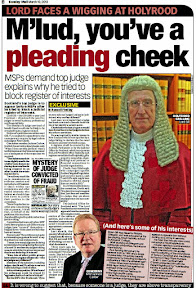
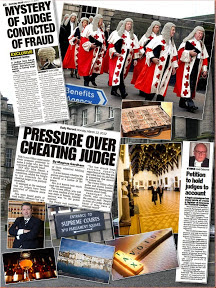
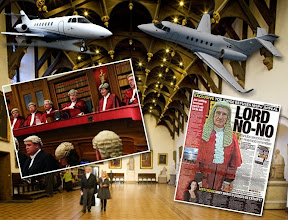


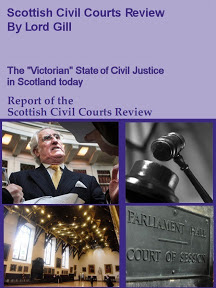
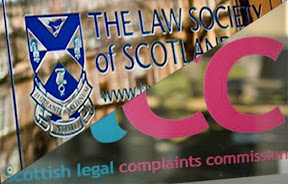



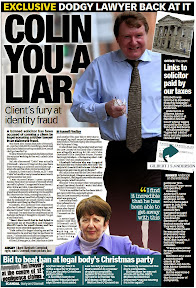
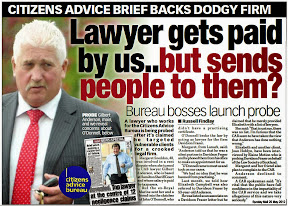



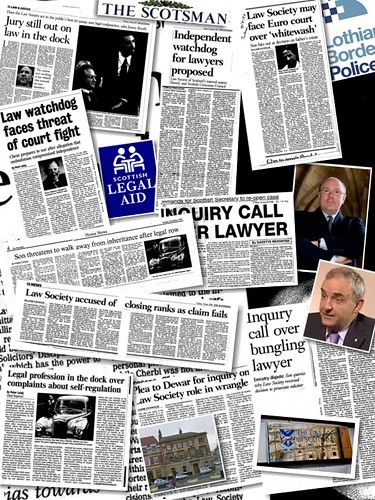




You must be logged in to post a comment.